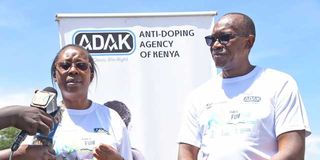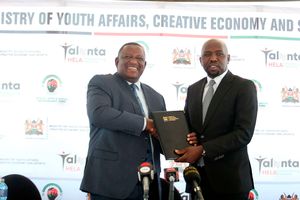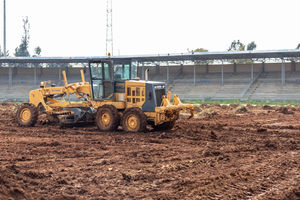
Anti-Doping Agency of Kenya CEO Sarah Shibutse, and Chairman Daniel Makdwallo, during a seminar on doping at Eliud Kipchoge Sports Complex in Kapsabet on November 11, 2023. Peninah Wahome is now the CEO and Joseph Kagunda the acting chairman.
Slashing the budget of the Anti-Doping Agency of Kenya (Adak) from Sh288 million to Sh20 million in September 2024 by the William Ruto government was a serious blow in the fight against use of banned performance enhancing substances by Kenyan athletes..
The move raised significant concerns about Kenya’s commitment to addressing the scourge of doping.
The reduction in funding sparked angry reaction from athletes, officials, and sports organisations.
Many wondered whether the government was fully committed in the fight against doping, especially considering the threat to Kenya's status as an athletics giant globally.
According to Athletics Integrity Unit, more than 100 Kenyan athletes are currently serving bans for doping offences.
Kenya has been a global giant in track and field, particularly in middle and long-distance running.
This success has been fuelled by the exceptional talent and dedication of Kenyan athletes, but also by the country's strategic investment in sports infrastructure, training programmes, and development of young talent.
However, cases of Kenyan athletes being caught up in doping scandals, tarnishing the nation’s reputation and posing a significant threat to the integrity of its sporting legacy has been on the rise.
The increased violation have prompted calls for enhanced efforts to combat the menace. Established in 2016, Adak has played a crucial role in combating doping in Kenyan sports.
The Kenyan anti-doping body was formed after World Anti-Doping Agency (Wada) warned the country of its poor anti-doping procedures.
In fact, Kenyan athletes were on the brink of being banned from competing in international events with the 2016 Rio de Janeiro Olympics hovering in the background due to increased cases of doping.
Kenya has been in Category A of countries worst hit by doping since 2016. The agency was tasked with enforcing anti-doping policies, educating athletes about the dangers of doping, conducting testing, and ensuring compliance with the World Anti-Doping Agency (Wada) code.
Over time, Adak’s role has become even more important as Kenya's international sports profile continues to grow.
But this has been blighted by high profile cases of doping involving Kenyans.
Former Olympic Marathon champion Jemimah Sumgong, and former 1,500m world champion Asbel Kiprop, who both tested positive for the use of erythropoietin within a year of each other, in 2016 and 2017, are just two cases in point.
Because of increased cases of violations, Kenya’s anti-doping efforts came under added scrutiny from international organisations, including the Wada and Athletes Integrity Unit.
These organisations expressed concern over the number of doping violations by Kenyan athletes and the country's wanting efforts to tackle the issue.
Adak was strengthened and given more resources leading to it ramping up testing of athletes.
Adak also increased its advocacy work sensitising athletics, officials and even journalists on the anti-doping code.
The reduced funding prompted Wada’s Africa Office Director, Rodney Swigelaar, to meet Kipchumba Murkomen, the Cabinet Secretary for Youth Affairs, Creative Economy and Sports in October last year in Nairobi to discuss matters related to strengthening Adak programmes.
At the meeting, Murkomen assured Wada that Adak’s annual budget would reflect the country’s commitment to clean up sports in the country.
The Adak budget was recently revised upward to Sh185 million as announced by Adak acting chairman Joseph Kagunda and Acting Adak CEO Peninah Wahome on June 3.
However, its was still well below the 2022/2-23 figures, and a time when the war on doping needs to be stepped up.
“Wada raised concerns in its audit of our programmes that other sports were not being adequately covered,” Wahome said.
Wahome however said the increased budget would allow them reach all federations and implement a more inclusive anti-doping strategy.
Reducing Adak’s budget jeopardised the agency's ability to carry out other vital functions, such as athlete support services, and international co-operation.
Adak admitted on June 3 that it struggled to test athletes outside track and field when its funding was cut. This in turn undermined the hard work and commitment of clean athletes.
See some of our other Ruto@1,000 coverage below:






